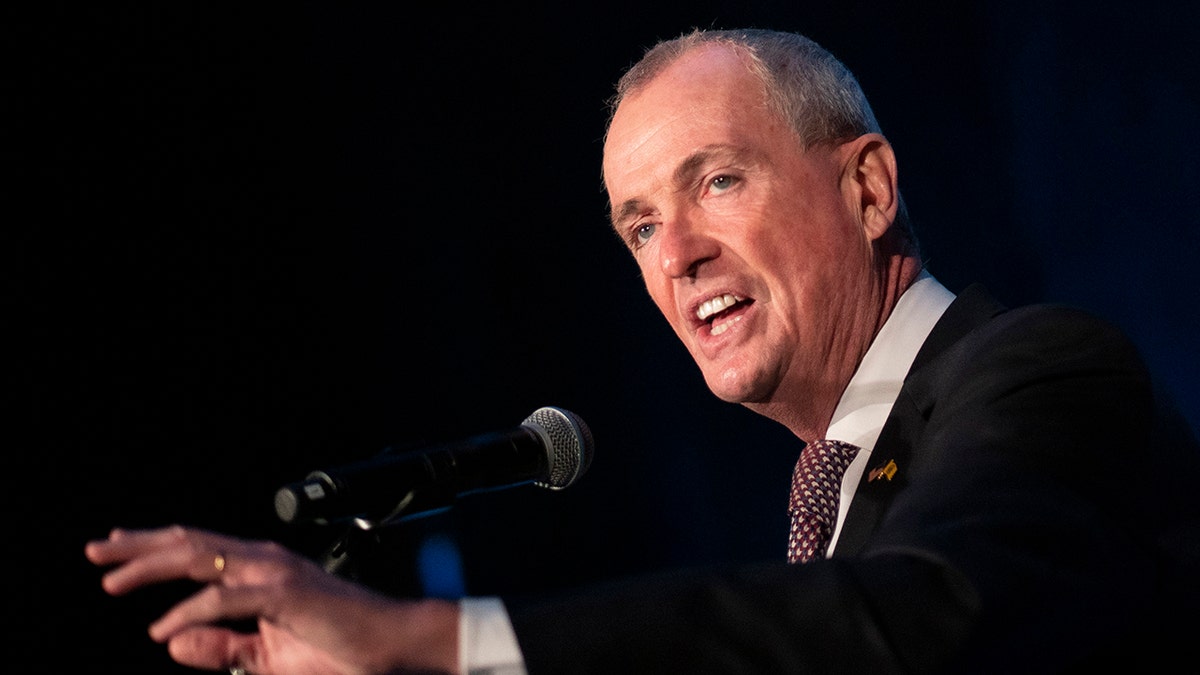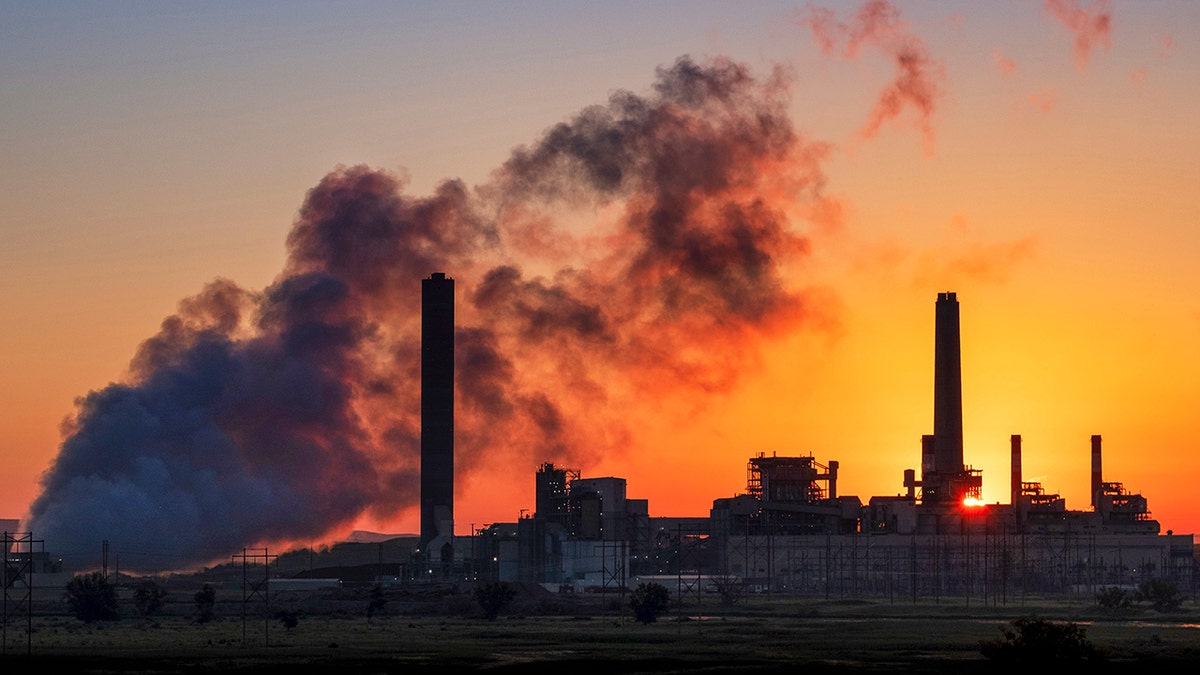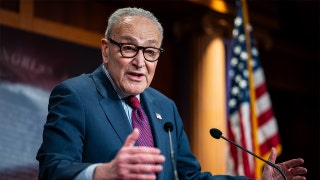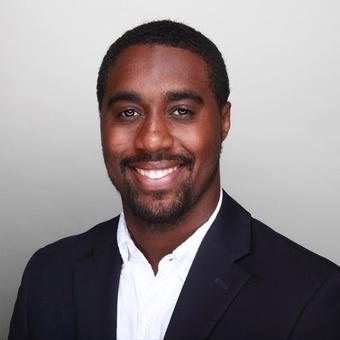Inflation Reduction Act does little to reduce climate change: Bjorn Lomborg
Copenhagen Consensus president discusses California's move to ban the sale of new gas-powered vehicles and if Biden's spending bill will help the climate as much as he says it will on 'America Reports.'
New Jersey is the first state to introduce a mandatory climate change curriculum in schools.
The New Jersey State Board of Education on June 2020 adopted First Lady Tammy Murphy’s K-12 climate change education. The First Lady led the effort to integrate a climate change curriculum with the help of 130 educators.
The curriculum was scheduled to be enacted this school year, which requires all students to learn about climate change.
New Jersey set the precedent by being the first state in the nation to incorporate climate change education across its K-12 academic standards.
NEW JERSEY SEX ED STANDARDS DISCUSSING ANAL SEX IN EIGHTH GRADE ‘AGE APPROPRIATE,' SAYS GOV. MURPHY

New Jersey Governor Phil Murphy delivers a victory speech to supporters at Grand Arcade at the Pavilion on November 3, 2021 in Asbury Park, New Jersey. (Eduardo Munoz Alvarez/Getty Images)
Gov. Phil Murphy, D., released a statement on September 6th that the curriculum is the "first of its kind" and "will prepare and propel New Jersey students to the top of the ranks for the thousands of green economy jobs that will be made available in the future."
The New Jersey State Board of Education has 13 members who are appointed by the governor. These members serve without compensation for six-year terms.
"New Jersey has the number one public education system in the nation, and our teachers and school administrators are well-equipped to prepare our future climate change leaders to take on the climate crisis," Governor Murphy said. "Our children are our future, and the lessons New Jersey students will learn with this new curriculum will bring us one step closer to building our green economy and reaching and sustaining 100 percent clean energy in New Jersey by 2050."
K-12 climate change education will focus on how climate change has accelerated in recent decades and how it's impacted public health, human society, and contributed to natural disasters.

Governor Murphy touted that the mandatory curriculum will help prepare New Jersey students for the green economy of the future. (AP Photo/J. David Ake)
Climate change education was also adopted by the state’s curriculum standard called New Jersey Student Learning Standards. The NJSLS laid out curriculum for New Jersey’s public schools and set "the foundation for school districts to craft instruction and curricula."
NJSLS’s K-12 climate change education was created to prepare students to understand how and why climate change happens and the impact it has on society as well as how people can respond to it. The standards will be incorporated across seven content areas such as "21st Century Life and Careers, Comprehensive Health and Physical Education, Science, Social Studies, Technology, Visual and, Performing Arts, and World Languages."
The integration of climate change standards into the appendices of the mathematics and English language arts guidelines "are up for review this year."
However, some are opposed to the mandatory curriculum saying it could cause unnecessary panic among students and give parents more freedom to choose where they send their kids to school if they disagree with a school's curriculum.
Bethany Mandel, children's book author and homeschooling mother of five, told Fox News Digital that childhood mental health and anxiety levels are at all-time highs, and studies indicate that climate change alarmism is contributing to this stress.
"It’s our job as adults and parents to keep sacred childhood innocence, and refrain from burdening children with the problems of the world before they’re able to process what they’re being taught. New Jersey is making a choice: they would rather turn children into foot soldiers for the cause of climate change vs. keep their mental and emotional health safe," she said.
"New Jersey public schools spend over $24,000 per student per year. That funding should go directly to families, so they can find alternatives. Curriculum disagreements illustrate the need for school choice. Families disagree about how they want their children to be educated. The one-size-fits-all government school system will fail to meet the varied needs of families by definition. The only way out of this mess is to allow families to take their children's education dollars to the education providers that best meet their needs and align with their values," senior fellow at the American Federation for Children Corey DeAngelis told Fox News Digital.
"As with every politically motivated change in curricula, our public schools would do well to provide balanced lesson plans that enlightened young minds rather than cause panic and anxiety. Should educators pursue a comprehensive approach, students need to understand the complexity of science and climate modeling as it pertains to Earth's long history of significant changes in climate. They should also be aware of the secondary and tertiary economic consequences of various policy choices now and generations hence," Vice President of Education Policy at California Policy Center Lance Christensen said.
"Climate scientists are still studying how and why our climate is changing. It seems premature to mandate a subject in K-12 that remains unresolved in the scientific community," said Patrick Wolf, Distinguished Professor of Education Policy at the University of Arkansas.
REPORT CARD ON BIG LABOR UNIONS SHOW SIGNIFICANT LOSS OF TEACHER UNION MEMBERSHIP SINCE 2018
The issue of education has become a top concern among voters heading into the midterm elections. Since the pandemic, school board meetings have become battlegrounds between parents and school board officials. Parents across the country have protested against COVID related restrictions in schools and controversial curriculum like critical race theory and gender theory. This has reignited the debate on how much control parents have over their children's education.
CLICK HERE FOR THE FOX NEWS APP
The fight for parental control of education spawned local groups like Fishers One based in Indiana and Minnesota Parents Alliance who launched an effort to train and support school board candidates and get parents involved in their schools and communities.
These parental rights groups hosted training for school board candidates across the state and plan to provide support for new school board members after elected to speak out against what they deem is indoctrination.











































